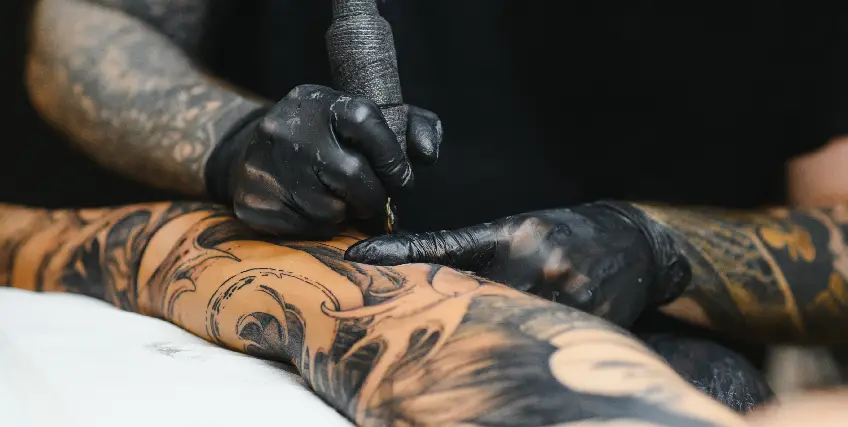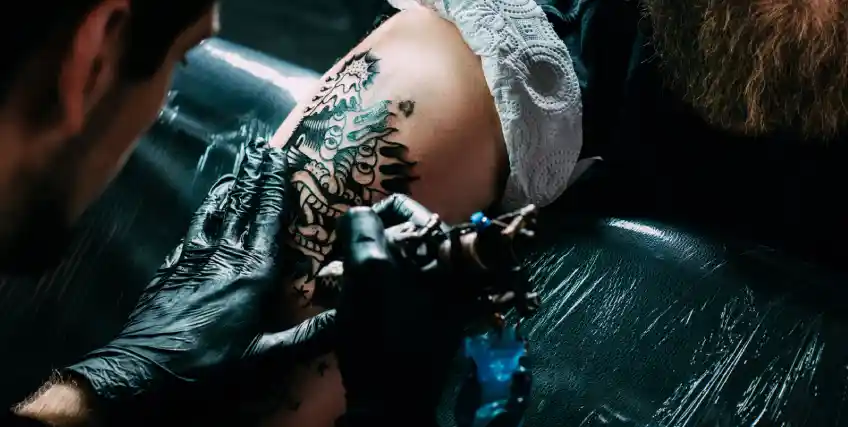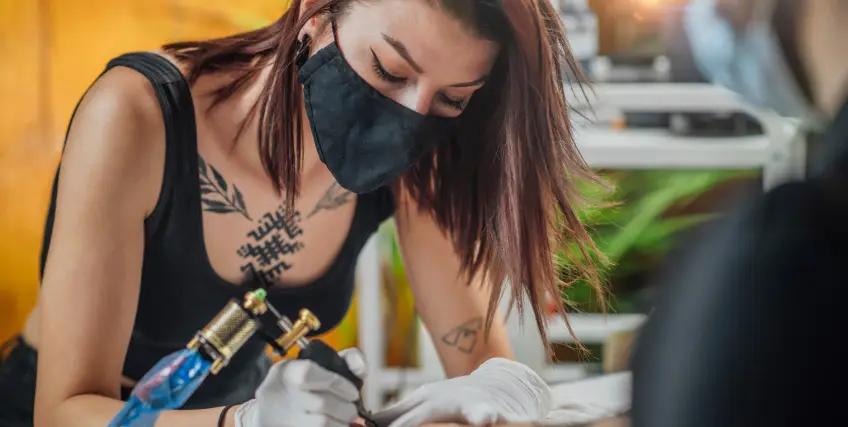Needle to Ink: How to Fund Your Tattoo Business with the Right Loan
Jul 25, 2025 | Last Updated on: Jul 28, 2025

As a tattoo artist, you’re an artist, but you’re also a businessperson. You need to build your own client base and, eventually, you may want to build your own tattoo studio. When you’re ready to take the next step, you’ll likely need business funding. Getting a tattoo loan can help you take your body art to the masses and achieve your dream tattoo parlor.
But knowing how to shade like a pro is one thing; having the business acumen to run a business is another. There’s a bit of a learning curve for most new small business owners, especially when it comes to finding the right financing option for your business. This comprehensive guide will walk you through how to fund your tattoo business with the right loan, exploring options from traditional bank loans to more specialized tattoo loans.
In this article:
- Understanding why you need business capital for small business when you’re just starting out.
- The best loans for tattoos shops and how to get them.
- How to improve your tattoo loan approval chances despite the tattoo industry being less understood by lenders.
Why Do You Need Tattoo Loans?
While most business owners tap into personal funds to start their businesses, in 2023, 43% of small businesses applied for a loan. Although the Biz2Credit June 2025 Small Business Earnings Report finds that small businesses are reporting higher revenues recently, they’re also reporting significantly higher expenses. This points to a business environment in which new business owners will have significant costs and added pressure to turn a profit quickly.
Loans can help give you some initial breathing room when you’re getting started. Some common expenses that tattoo loans can cover include:
- Startup costs: Opening a tattoo parlor can cost between $15,000 to $100,000 or more. Those significant startup costs include rent, initial inventory of inks and needles, sterilization supplies, furniture, and licensing.
- Equipment costs: High-quality tattoo machines, autoclaves, ultrasonic cleaners, medical-grade lighting, and specialized seating make all the difference for a new shop.
- Working capital: The cost of your tattoo shop doesn’t simply stop once you open. You’ll have ongoing operational expenses like payroll, supplies, marketing, and insurance that you need to cover.
- Marketing and branding: When you’re just starting out, you’ll need to develop a professional website, get the word out through social media, and build a strong brand identity. You might do that by offering flexible payment options like buy now pay later plans or leverage partners like Klarna to support interest-free payment plans for larger tattoos. A tattoo loan can help you finance promotions like this that can lock in a loyal customer base.
It’s important to take the time to understand your financial requirements before you begin to explore the loans for tattoo shops available to you.
Types of Tattoo Loans
Like any small business, getting a tattoo loan will require a solid business plan and a clear understanding your financial needs. Getting those things done first will help you understand which of these financing solutions may be best for you.
1. Term Loans
When you think of a loan, you’re probably thinking of a term loan. Both traditional lenders and online lenders offer term loans, which pay you an upfront lump sum in exchange for monthly payments based on an interest rate. This predictability can be helpful for budgeting and the lump sum gives you the flexibility to address a wide range of expenses, which makes them useful startup loans.
That said, traditional banks and credit unions typically have strict eligibility requirements, including a strong credit history, a minimum time in business, and annual revenue requirements. Online lenders may have less strict eligibility criteria, but often at the cost of higher interest rates and shorter repayment terms.
Nonetheless, if you can qualify for a term loan, you can get the capital to address many business needs while the regular installment repayments can give you some consistency as you’re building your business.
2. Small Business Administration (SBA) Loans
The U.S. Small Business Administration (SBA) works with participating lenders to partially guarantee loans, incentivizing them to approve more loans for small businesses. Yes, that includes tattoo loans. Some of the most popular SBA loans include:
- SBA 7(a) Loans: The most popular SBA loan program offers flexible financing for a wide range of business purposes, including working capital, equipment purchases, and real estate.
- SBA Microloans: These loans are for up to $50,000 and are generally easier to qualify for than 7(a) loans. They may function as a good tattoo loan when you’re just getting started.
- SBA 504 Loans: Designed for long-term, fixed-asset purchases, such as real estate or major equipment. They involve a partnership between a commercial lender, a Certified Development Company (CDC), and the borrower.
SBA loans often offer the most competitive interest rates and longest repayment terms. However, the application process is rigorous and requires extensive documentation and a strong business plan.
3. Equipment Financing
Tattoo artists require specialized equipment. You can use a more general tattoo loan, like a term loan, to get new tattoo machines and other equipment, but it might be more efficient to pursue equipment financing instead.
With equipment loans, the equipment itself serves as collateral for the loan. That means that if you default, the lender can repossess the equipment. But because of that collateral, these loans are generally easier and faster to get, allowing you to load up on the equipment you need quickly.
4. Business Line of Credit
A business line of credit is a flexible financial safety net that works a bit like a cross between a credit card and a term tattoo loan. Instead of a lump sum, you get access to a revolving credit limit that you can draw from as you need. You only pay interest and fees on the amount you borrow, and when you repay what you’ve borrowed, you’ll have access to the full amount again.
A line of credit gives you significant flexibility for managing cash flow without putting you on the hook for expensive monthly payments. They can, however, be an expensive borrowing option with high interest rates and fees, such as draw fees and annual fees. Still, they tend to be much easier to qualify for than conventional small business loans and can provide the flexibility when your business is still new.
What to Consider When Applying for Tattoo Loans
Regardless of the type of tattoo loan you pursue, it’s important to keep these considerations in mind:
- You need a business plan: New businesses don’t have the credit history or revenue history that lenders want to see. Even established tattoo parlors may struggle to make inroads with lenders who don’t understand the tattoo industry without a business plan. This roadmap should detail your market analysis, goals for the money, and strategy for repaying the loan. It shows that you’ve thought through every aspect of your business.
- Keep strong financial records: Stay organized and keep bank statements, tax returns, profit and loss statements, and balance sheets up to date. You’ll need them when you apply. Gathering all your necessary documentation ahead of time can help streamline the application process.
- Understand your qualifications: Lenders look at both your personal and business credit scores and the financial picture of your business for tattoo loans. Don’t waste your time applying somewhere you know won’t approve you. Do your due diligence, but be realistic about what you can qualify for.
- Research and compare lenders: Don't just take the first loan offer. Shop around, compare interest rates, fees, repayment terms, and lender reputations before making a decision.
Final Thoughts
Making the leap from a tattoo artist to a business owner is an exciting prospect. Tattoo loans can help you lay the groundwork for your long-term success. Whether you have excellent personal credit to lean on for traditional bank loans or SBA loans, or your business is lagging and you need the flexibility of a business line of credit, there are many tattoo loans that can support your needs. Don’t let financial hurdles derail your dream; with the right approach, you can find the financing your business needs.
FAQs About Tattoo Loans
How much does it typically cost to open a tattoo shop?
The cost to open a tattoo shop can vary widely depending on location, size, and luxury. According to BusinessDojo, the cost typically ranges between $15,000 and $100,000.
Can I get a loan for a new tattoo business without an extensive operating history?
It’s typically harder for new businesses to qualify for traditional loans, but SBA loans and business lines of credit may be more available to startups. Online lenders are also generally more willing to work with startups, but tend to have higher interest rates.
What kind of collateral is typically required for tattoo loans?
Collateral requirements vary between loan type and lender. You may have to provide a personal guarantee for some loans, meaning you will become personally responsible for the loan if your business fails to repay it. New businesses don’t necessarily need collateral for financing options like unsecured lines of credit and MCAs.
How important is my personal credit score when applying for tattoo loans?
If you’re just getting started, it’s very important. Since you have no business credit history, lenders will use your personal credit score as an indicator of your financial responsibility. A strong personal credit score can lead to better interest rates and more favorable loan terms, even for business-specific tattoo loans.
What's the fastest way to get funding for a tattoo business?
It depends on your particular situation, but usually, online lenders and MCAs provide faster funding than traditional term loans.
Frequent searches leading to this page
Term Loans are made by Itria Ventures LLC or Cross River Bank, Member FDIC. This is not a deposit product. California residents: Itria Ventures LLC is licensed by the Department of Financial Protection and Innovation. Loans are made or arranged pursuant to California Financing Law License # 60DBO-35839




